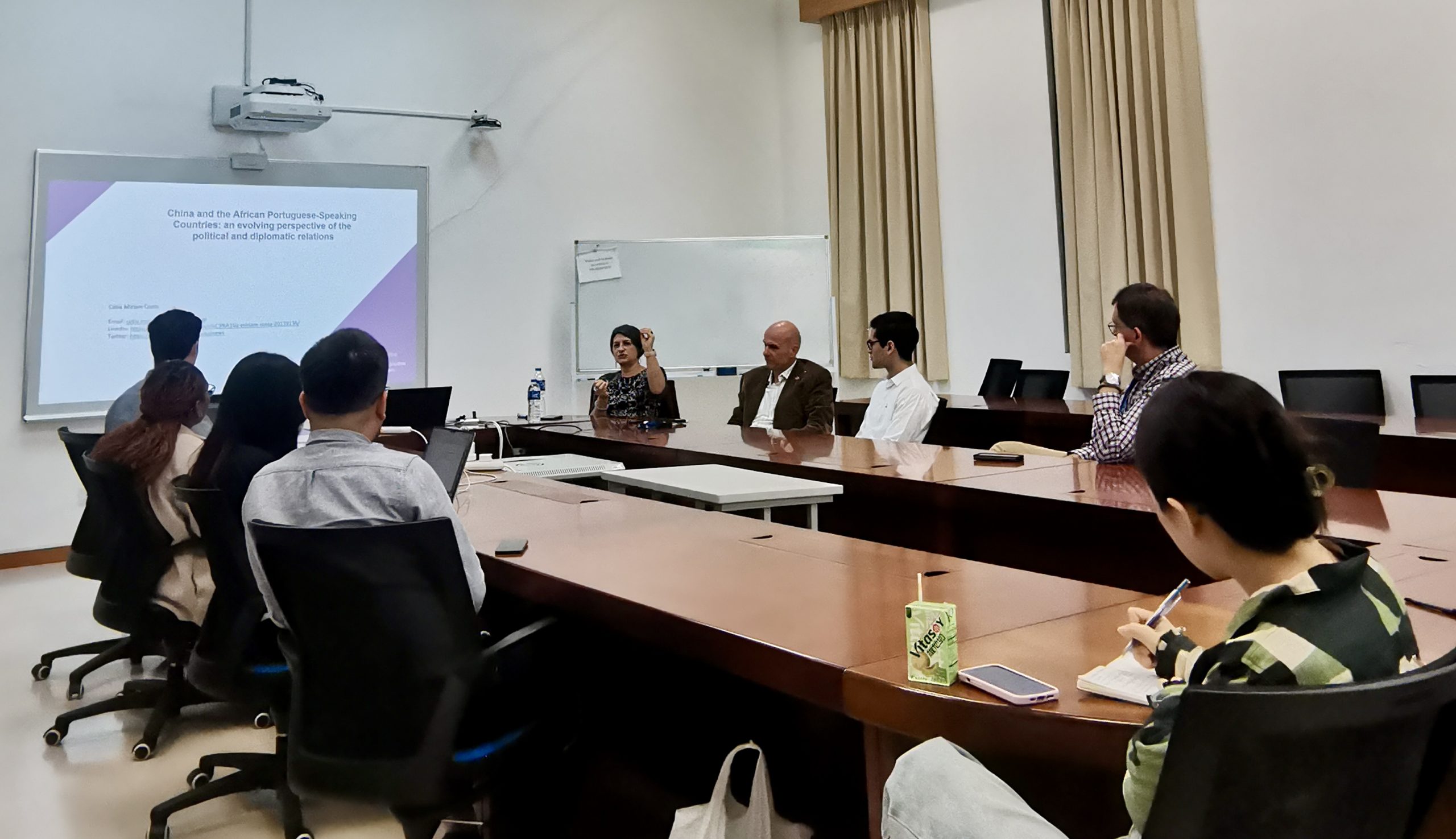04DEC2024 – Professor Catia Miriam from ISCTE-IUL, Portugal, delivered an enlightening conference at the Faculty of Social Sciences (FSS) and the Department of Government and Public Administration (DGPA). The conference focused on the intricate relations between China and African Portuguese-speaking countries, drawing a keen audience of students and academic staff.
One of the key points Professor Miriam highlighted was the continuity of informal diplomatic relations between China and Portugal, which persisted until 1979. Despite the formal diplomatic hiatus, China maintained a strategic interest in Portuguese-speaking countries from 1949 to 1975. This period was marked by China’s efforts to foster connections and influence within these nations, reflecting its broader geopolitical strategies.
Professor Miriam emphasized that China never closed its doors to foreign affairs and international cooperation. This openness was a cornerstone of China’s foreign policy, allowing it to build and sustain relationships even during politically turbulent times. The conference underscored how China’s diplomatic strategies were not just reactive but proactive, aiming to establish a global presence.
A significant portion of the conference was dedicated to discussing China’s push for a “global China” in Africa, which later extended to the entire Global South. This strategic expansion was part of China’s broader vision to enhance its influence and foster solidarity among developing nations. Professor Miriam illustrated this point by referencing various historical and cultural sources, including the Peking Review, the Soldiers of Pen, the All-African People’s Conference, Chinese press opinions (1961), and the Afro-Asian Literature Series.
These sources provided a rich context for understanding China’s diplomatic and cultural outreach. The Peking Review, for instance, was instrumental in disseminating China’s perspectives and policies to a global audience. The Soldiers of Pen highlighted the role of intellectuals and writers in shaping and promoting China’s foreign policy narratives. The All-African People’s Conference and Chinese press opinions from 1961 showcased China’s active engagement with African nations, while the Afro-Asian Literature Series reflected the cultural dimensions of China’s international relations.
Professor Miriam’s conference was not only informative but also thought-provoking, encouraging attendees to consider the historical and contemporary implications of China’s foreign policy. Her insights into the continuous and strategic nature of China’s relations with Portuguese-speaking countries provided a nuanced understanding of global geopolitics.
Overall, the conference was a significant academic event that enriched the knowledge of FSS and DGPA students and staff. It highlighted the importance of historical context in understanding current international relations and underscored the value of interdisciplinary approaches in studying global politics. Professor Miriam’s expertise and engaging presentation style left a lasting impact on the audience, inspiring further exploration and discussion on the topic.
2024年12月4日——來自葡萄牙ISCTE-IUL的Catia Miriam教授在澳門大學社會科學學院(FSS)及政府與行政學系(DGPA)舉辦了一場啟發性的學術會議。會議聚焦於中國與非洲葡語國家之間錯綜複雜的關係,吸引了眾多學生與教職員工的熱切關注。
Miriam教授指出,中國與葡萄牙之間的非正式外交關係一直持續到1979年,儘管在此期間正式外交關係中斷,但中國在1949年至1975年間始終對葡語國家保持戰略興趣。這一時期,中國積極推動與這些國家建立聯繫與影響力,體現了其更廣泛的地緣政治戰略。
她強調,中國從未關閉外交事務與國際合作的大門。這種開放性是中國外交政策的基石,使其即使在政治動盪時期也能建立並維持國際關係。會議強調,中國的外交戰略不僅是被動應對,更是主動出擊,旨在建立全球影響力。
會議的重要部分討論了中國在非洲推動“全球中國”戰略的努力,這一戰略後來擴展至整個全球南方。這一戰略擴張是中國增強影響力、促進發展中國家團結的宏大願景的一部分。Miriam教授通過引用多個歷史與文化資料來闡述這一觀點,包括《北京週報》、《The Soldiers of Pen》、《The All-African People’s Conference》、1961年中國媒體評論以及《The Afro-Asian Literature Series》。
這些資料為理解中國的外交與文化拓展提供了豐富背景。例如,《北京週報》在向全球傳播中國觀點與政策方面發揮了重要作用;《筆之戰士》強調了知識份子與作家在塑造和推廣中國外交敘事中的作用;《泛非人民會議》與1961年中國媒體評論展示了中國與非洲國家的積極互動;而《亞非文學叢書》則體現了中國國際關係中的文化維度。
Miriam教授的會議不僅資訊豐富,而且發人深省,鼓勵與會者思考中國外交政策的歷史與現實意義。她對中國與葡語國家持續而戰略性的關係的深入分析,為理解全球地緣政治提供了細緻入微的視角。
總體而言,這場會議是一次重要的學術活動,豐富了FSS與DGPA師生的知識,強調了在理解當前國際關係時歷史背景的重要性,並突出了跨學科方法在全球政治研究中的價值。Miriam教授的專業知識與富有感染力的演講風格給聽眾留下了深刻印象,激發了進一步探索與討論的興趣。



